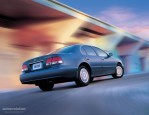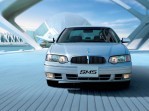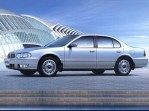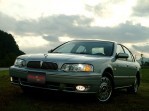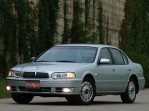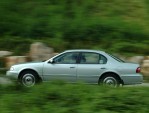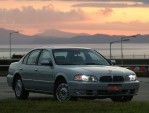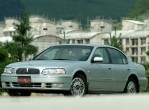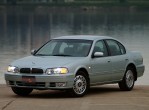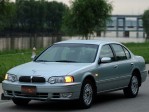Segment: Large
Production years: 1998, 1999, 2000, 2001, 2002, 2003, 2004
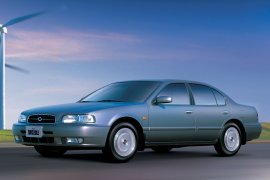 19 Photos
19 PhotosSamsung Motors introduced the SM5 as its flagship model in 1998, and it was a badged-engineered product of the fourth generation of the Nissan Maxima.
The Korean industrial giant Samsung established Samsung Motors in 1994 after it inked a deal with the Japanese automaker Nissan to help them produce cars. As a result, one of the first products was the 1998 Samsung SQ5, which was later renamed SM5. While it was mostly a Nissan Cefiro/Maxima, it sported the Korean automaker’s logos and was built in Korea at Samsung’s factory in Busan. Unfortunately for the young car brand, its independence didn’t last too long due to the Asian financial crisis in the late 90s, and Samsung had to sell its automotive business to Renault in 2000. The French automaker had already formed an alliance with Nissan in March 1999, so things went smoother.
Samsung had its ideas regarding cars and imposed them when it penned the SM5. As a result, the front fascia featured different headlights than its Maxima sister. These sported larger inner headlamps for the high beams that partly intruded into the front bumper. Between them, the automaker placed the grille with thin vertical slats and a chromed surrounding. On the lower side of the bumper, the SM5 featured a broad air intake crossed by a horizontal slat and flanked by a pair of fog lamps. Last but not least, Samsung installed a chromed badge on the hood.
From its profile, the four-door sedan sported curved lines that resembled the bio-design era from the early ‘90s. The flush door handles and the body-colored trims applied on the doors offered a luxurious look for the car. Still, the B-pillars were black, creating the image of larger windows, and didn’t have any chromed elements. Finally, at the back, the automaker installed wide taillights extended from the quarter panels onto the trunk’s lid, with the upper section reserved for the reversing lights.
Inside, Samsung tried to create a luxurious cabin with standard fabric upholstery and an option for leather-wrapped seats. In addition, several wood trims adorned the dashboard, the center stack, the door cards, and the center console. Like its Japanese brother, the SM5 featured a clean layout for the instrument cluster where the fuel level and coolant temperature gauges flanked the speedometer and the tachometer. In addition, a small LCS placed on the lower side of the panel showed the odometer.
Samsung installed a choice of three engines under the SM5’s hood: two inline-four and a V6. The former versions sent their power to the front wheels via five-speed manual transmissions, while the V6 was a four-speed automatic affair. Unfortunately, the main downturn of the SM5 was the torsion beam for the rear suspension carried over from the Maxima. That couldn’t provide the expected comfort of a premium mid-size sedan. But still, it was good enough for the young Korean automaker.
SAMSUNG SM 5 1998, 1999, 2000, 2001, 2002, 2003, 2004
- 1.8L 5MT (134 HP)
- 2.0L 5MT (144 HP)
- 2.5L V6 4AT (173 HP)
SAMSUNG SM 5
1.8L 5MT (134 HP)
ENGINE SPECS - 1.8L 5MT (134 HP) | |
|---|---|
| Cylinders: | L4 |
| Displacement: | 1838 cm3 |
| Power: | 98 KW @ 6200 RPM 133 HP @ 6200 RPM 131 BHP @ 6200 RPM |
| Torque: | 119 lb-ft @ 4800 RPM 161 Nm @ 4800 RPM |
| Fuel System: | Multipoint Injection |
| Fuel: | Gasoline |
| Fuel capacity: | 17.2 gallons (65.1 L) |
PERFORMANCE SPECS | |
|---|---|
| Top Speed: | 117 mph (188 km/h) |
| Acceleration 0-62 Mph (0-100 kph): | 10.5 s |
TRANSMISSION SPECS | |
|---|---|
| Drive Type: | Rear Wheel Drive |
| Gearbox: | 5-Speed manual |
BRAKES SPECS | |
|---|---|
| Front: | Ventilated Discs |
| Rear: | Discs |
TIRES SPECS | |
|---|---|
| Tire Size: | 185/70 R14 |
DIMENSIONS | |
|---|---|
| Length: | 190 in (4826 mm) |
| Width: | 69.9 in (1775 mm) |
| Height: | 55.7 in (1415 mm) |
| Front/rear Track: | 60.2/59.4 in (1,529/1,509 mm) |
| Wheelbase: | 106.3 in (2700 mm) |
| Cargo Volume: | 17 cuFT (481 L) |
| Aerodynamics (Cd): | 0.34 |
WEIGHT SPECS | |
|---|---|
| Unladen Weight: | 2913 lbs (1321 kg) |
FUEL ECONOMY (NEDC) | |
|---|---|
| Combined: | 24.7 mpg US (9.5 L/100Km) |
| CO2 Emissions: | 226.1 g/km |
SAMSUNG SM 5
2.0L 5MT (144 HP)
ENGINE SPECS - 2.0L 5MT (144 HP) | |
|---|---|
| Cylinders: | L4 |
| Displacement: | 1998 cm3 |
| Power: | 105.9 KW @ 6400 RPM 144 HP @ 6400 RPM 142 BHP @ 6400 RPM |
| Torque: | 134 lb-ft @ 4000 RPM 182 Nm @ 4000 RPM |
| Fuel System: | Multipoint Injection |
| Fuel: | Gasoline |
| Fuel capacity: | 17.2 gallons (65.1 L) |
PERFORMANCE SPECS | |
|---|---|
| Top Speed: | 126 mph (203 km/h) |
| Acceleration 0-62 Mph (0-100 kph): | 9.8 s |
TRANSMISSION SPECS | |
|---|---|
| Drive Type: | Rear Wheel Drive |
| Gearbox: | 5-Speed manual |
BRAKES SPECS | |
|---|---|
| Front: | Ventilated Discs |
| Rear: | Discs |
TIRES SPECS | |
|---|---|
| Tire Size: | 185/70 R14 |
DIMENSIONS | |
|---|---|
| Length: | 190 in (4826 mm) |
| Width: | 69.9 in (1775 mm) |
| Height: | 55.7 in (1415 mm) |
| Front/rear Track: | 60.2/59.4 in (1,529/1,509 mm) |
| Wheelbase: | 106.3 in (2700 mm) |
| Ground Clearance: | 17.3 in (439 mm) |
WEIGHT SPECS | |
|---|---|
| Unladen Weight: | 3186 lbs (1445 kg) |
| Gross Weight Limit: | 4156 lbs (1885 kg) |
FUEL ECONOMY (NEDC) | |
|---|---|
| Combined: | 25.5 mpg US (9.2 L/100Km) |
| CO2 Emissions: | 219 g/km |
SAMSUNG SM 5
2.5L V6 4AT (173 HP)
ENGINE SPECS - 2.5L V6 4AT (173 HP) | |
|---|---|
| Cylinders: | V6 |
| Displacement: | 2495 cm3 |
| Power: | 127.2 KW @ 6400 RPM 173 HP @ 6400 RPM 171 BHP @ 6400 RPM |
| Torque: | 163 lb-ft @ 4000 RPM 221 Nm @ 4000 RPM |
| Fuel System: | Electronic Injection |
| Fuel: | Gasoline |
| Fuel capacity: | 17.2 gallons (65.1 L) |
PERFORMANCE SPECS | |
|---|---|
| Top Speed: | 119 mph (192 km/h) |
| Acceleration 0-62 Mph (0-100 kph): | 11.1 s |
TRANSMISSION SPECS | |
|---|---|
| Drive Type: | Rear Wheel Drive |
| Gearbox: | 4-speed automatic |
BRAKES SPECS | |
|---|---|
| Front: | Ventilated Discs |
| Rear: | Discs |
TIRES SPECS | |
|---|---|
| Tire Size: | 185/70 R14 |
DIMENSIONS | |
|---|---|
| Length: | 190 in (4826 mm) |
| Width: | 69.9 in (1775 mm) |
| Height: | 55.7 in (1415 mm) |
| Front/rear Track: | 60.2/59.4 in (1,529/1,509 mm) |
| Wheelbase: | 106.3 in (2700 mm) |
| Ground Clearance: | 17.3 in (439 mm) |
WEIGHT SPECS | |
|---|---|
| Unladen Weight: | 3186 lbs (1445 kg) |
| Gross Weight Limit: | 4178 lbs (1895 kg) |
FUEL ECONOMY (NEDC) | |
|---|---|
| Combined: | 22.8 mpg US (10.3 L/100Km) |
| CO2 Emissions: | 245.1 g/km |

